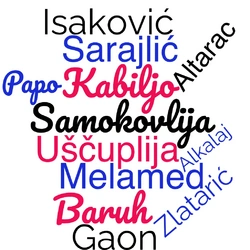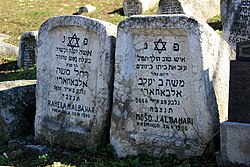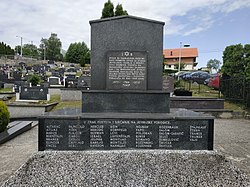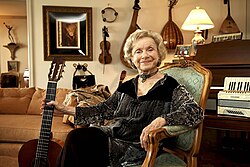
Bosnian Jewish surnames, known sometimes as Saraynikos, are those carried by individuals born in or descended from people born mainly in the Jewish communities of Sarajevo (known also as Saray in Ladino) Tuzla and Banja Luka, as well as smaller ones in the cities of Mostar, Doboj and Rogatica. Additionally, the Bosnian Jewish diaspora is also present in Israel, United States, France, Latin America and Serbia.
The first Jews to settle in what today is Bosnia and Herzegovina were of Romaniote origin, with at least one Jewish building of worship from the Middle Ages surviving as physical evidence of Jewish presence in the region; the remnants of a Roman or Byzantine synagogue were discovered in the town of Dabravine, near Zenica. In 1189, the Banate of Bosnia issued a charter ensuring mutual free trade and movement of merchants from Dubrovnik across Bosnian territory, enticing several Jewish merchants to settle in the area. However, the biggest arrival in numbers and influence has been of the Sephardic Jews, which started to arrive after the Alhambra Decree and continued to make it to the Balkans following the welcoming policies of the Ottoman Empire as well as the pressure of the Spanish Inquisition and the arrival of Sephardic Jews from other parts of the Ottoman Empire, like Salonika, Sofia, Edirne and Monastir.[1] The latest arrival, the Ashkenazi Jews, arrived from Hungary in 1686, when the Ottoman Turks were expelled from Hungary, which continued to settle in Bosnia after the Austro-Hungarian Empire occupation of Bosnia and Herzegovina in 1878, concentrating mostly in Tuzla.
Bosnian Jewish naming conventions

Many Bosnian Jews used Ladino or Hebrew first names, and surnames were fluid before modern bureaucracy. However, as in most of Central and Eastern Europe, the use of hereditary surnames among Ashkenazi Jews in Serbia did not take place until the Edict of Toleration was issued by Joseph II for the Jews of Hungary in 1783. Sephardic Jews did bring hereditary surnames with them,[2] as the custom of surnames had already existed in the Iberian Peninsula for over around 700 years. While there is no official language in Bosnia and Herzegovina but the Dayton Agreements de facto recognize Serbian, Croat and Bosnian as separate languages rather than Serbo-Croatian (one of the official languages of former Yugoslavia), some spelling differences can be found when comparing documents issued by Ottoman, Austro-Hungarian and Yugoslav authorities as well as modern documents issued by Republika Srpska and the Federation of Bosnia and Herzegovina, especially taking into account that in Serbian, foreign names are phonetically transliterated, while this is not done in the other variants of Serbo-Croatian. Thus, it is expected to see spelling variations like Kiš instead of Kiss, Davičo instead of Davicho, Šlomović instead of Solomonovich; Alkalaj instead of Alcalay; Kon instead of Kohn and Šefer instead of Schäffer. Similarly and depending on the time period, names in the tombstones may be written in Hebrew and either Cyrillic or Latin characters, with names in Cyrillic alphabet being found in cemeteries in areas with Serbian majorities. However, Latin characters are more common, especially in tombstones from the Habsburg and Hungarian monarchies.
After the Ottoman rule ended in the country and especially after the incorporation into the Kingdom of Yugoslavia and later the Socialist Federal Republic of Yugoslavia, Slavicization of names became common, with classic Sephardic surnames like Ben Yitzhak becoming Isaković, etc.
Bosnian Jewish surnames of toponymic origin

These surnames reflect towns, cities, or countries where families lived prior to or upon arriving in Bosnia.
- Papo – possibly from Pavia (Italy), or Ladino for “father”
- Toledano – “from Toledo,” Spain
- Almosnino – possibly from a town in Spain or North Africa
- Elazar – also patronymic, but sometimes place-linked
- Navarro – “from Navarre” (northern Spain)
- Aronović – Ashkenazi, meaning “son of Aaron”
- Salom – from Shalom, but also used as a toponym in Catalonia
- Seroussi / Serusi – from Siracusa or Serres
- Sarajlić – “from Sarajevo” (Bosnianized form)
- Tuzlić – “from Tuzla,” likely adopted post-arrival
- Albala – from Hispano-Arabic al-balaṭ, meaning "the path"
- Uščuplija - "from Skopje" in today's Norhern Macedonia[3]
- Samokovlija - "from Samoko" in today's Bulgaria[3]
- Alkalaj - "from Alcola" – a town in Spain
Bosnian Jewish surnames of patronymic origin
These surnames stem from Hebrew or Arabic given names, often adapted to local usage.
- Altarac – possibly from Alter, an Ashkenazi personal name
- Salom / Salomons – from Shlomo (Solomon)
- Mordo / Mordechai – from Mordechai, often shortened
- Yosipovich / Josipović – “son of Joseph”
- Isaković – “son of Isaac”
- Benvenisti – from Bene Veniste, “well arrived” (Spanish)
- Levy / Levi – from the Levite tribe
- Abenjacar – Arabic/Sephardic for “son of Yaqar”
- Nahmias – Hebrew root Nehemiah, used widely in Sephardic communities
- Bunis – surname that evolved from the female given name name Bune found among later Ashkenazi migrants
Bosnian Jewish surnames of occupational origin
These reflect ancestral professions, often Arabic- or Ladino-derived, and sometimes adapted into Slavic forms.
- Altaras – from Altair or Al-Tarās, Arabic for “goldsmith” or “shield maker”
- Atijas – from Arabic atiyya, “gifted”; possibly ceremonial or professional
- Aškenazi – "Ashkenazi," sometimes used to indicate ethnic origin (especially among Sephardim)
- Ovadja – from Ovadyah, possibly rabbinic or religious leadership
- Ozerović – from Ozer, meaning “helper” (Hebrew)
- Kabiljo / Kavillo – possibly from kabil (Arabic “tribal chief”), or from Spanish cabillo, small rope, possibly guild-related
- Finci – possibly related to finance, traders, or moneylenders
- Bencion / Bensiyon – from Ben Tzion (“son of Zion”), may imply rabbinic status
- Gaon – “excellence" or "genius", a non-formal title given to certain Jewish Rabbis.
- Baruh – “blessed,” sometimes used by religious leaders or scribes
- Šerari / Sharari – possibly linked to sharar (guardians or officials)
Bosnian Jewish surnames of Sephardic origin
These surnames were preserved from Spain or re-adapted via Ottoman ports and cities.
- Kalderon – “cauldron maker” (Spanish occupational name)
- Pereira – “pear tree,” common in Sephardic tradition
- Albahari – “the seafarer,” Arabic-rooted, used across North Africa
- Montiljo – from Montilla, Spain
- Abarbanel – prominent Sephardic dynasty
- Benaroya – Ladino for “son of joy”
- Almeleh – “from the king” or “king’s servant”
- Zlatarić – from zlatar (goldsmith), Slavicized but of possible Sephardic artisan origin
- Israel / Israilović – from Israel, sometimes Slavicized
- Rosado – “pink” or “rosy”. Very rare.[2]
Bosnian Jewish surnames of descriptive origin
Names that reflect moral qualities, religious values, or traits.
- Barzilay – “iron” in Hebrew, strength and protection
- Nahmias – “comforter” (Nehemiah)
- Tovi / Tovija – “God is good”
- Elbaz – “the falcon,” possibly metaphorical or craft-linked
- Benveniste – “welcome one,” from Latin bene venire
- Nisim / Nissim – “miracles”
- Tzadik – “righteous”
- Moreno – “dark one,” also used by crypto-Jews in Spain
- Baruh – “blessed”
- Mazal – “luck” or “fortune”
Bosnian Jewish surnames of aristocratic of rabbinical origin
These surnames belonged to notable scholars, religious leaders, or respected families in Sarajevo and beyond.
- Danon / Danun – Sarajevo rabbinic dynasty
- Russo – “Russian,” also found in Sephardic circles
- Aron / Aronović – rabbinic family name
- Kabiljo – mentioned above; often associated with leadership
- Barzelon – variant of Barzilay, may reflect North African roots
- Menahem – “comforter,” used by Sephardic scholars
- Salom – prominent Sarajevo rabbinic family
- Altarac / Altaras – respected family name among Balkan Sephardim
- Papo – frequently held positions of communal leadership in Bosnia and other places in the Balkans
- Gaon – “excellence" or "genius", a non-formal title given to certain Jewish Rabbis.
Celebrities with Bosnian Jewish surnames

- Flory Jagoda, born Flora Papo - Bosnian-American guitarist, composer and singer-songwriter of songs in Ladino, famous for "Ocho Kandelikas."
- Eliezer Papo, professor of Jewish folklore, and Sephardic culture and literature, deputy director of the Moshe David Gaon Center for Ladino Studies
- Greta Ferušić Weinfeld - Dean of architecture at the University of Sarajevo and the only person in the world to survive both Auschwitz and the Siege of Sarajevo
- Yehoram Gaon, Israeli actor, TV producer and singer
- Judah ben Solomon Chai Alkalaj - rabbi and kabbalist, one of the influential precursors of modern Zionism
- Oskar (Šlomo) Danon, Bosnian-born Serbian composer and conductor of the conductor of the Belgrade Philharmonic Orchestra, the Royal Philharmonic Orchestra and the Vienna State Opera.
See also
- Sephardic Jewish ethnicity
- Ashkenazi Jewish ethnicity
- Sephardic Jewish surnames
- Ashkenazi Jewish surnames
- Serbian surnames
- Macedonian Jewish surnames
- Hungarian Jewish surnames
- Russian Jewish surnames
- Bulgarian Jewish surnames
- Hebrew surnames
- Balkan ethnicity
- Slovene surnames
- Croatian surnames
- Jewish surnames
- Hebrew surnames
- Bosnian surnames
- Serbian Jewish surnames
Explore more about Bosnian Jewish surnames
- ↑ Nezirović, Muhamed. The Sephardim of Bosnia. eSefarad
- ↑ 2.0 2.1 Jewish Surnames with special reference to Bosnia and Herzegovina
- ↑ 3.0 3.1 The Sephardim of Bosnia. Spirit of Bosnia


